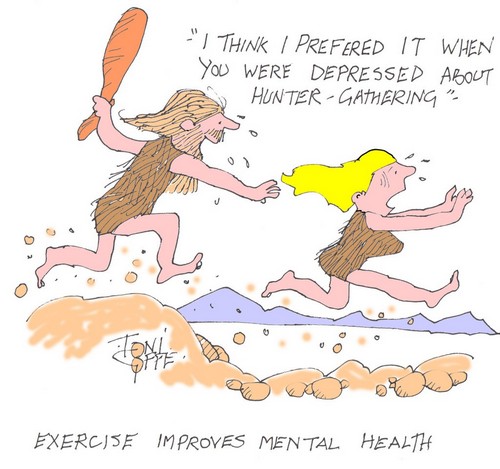MENTAL HEALTH
What is mental health?
Last week I described some of the benefits of exercise in preventing and treating the commonest mental illnesses – anxiety and depression. This week it is Mental Health which I am addressing.
Just as physical health is not defined as the absence of physical disease so with mental health. In practice it is impossible to disentangle the physical and the mental contributions to health . Mind and body are inextricably intertwined and equally involved in “wellness” and “quality of life”.
Mental health includes our emotional, psychological, and social well-being. It affects how we think, feel and act. It also helps determine how we handle stress, relate to others, and make choices. Mental health is important at every stage of life, from childhood and adolescence through adulthood.
Good mental health is more that the absence of mental illness – it is a positive characteristic indicating such feelings as happiness, wellbeing, quality of life and joie de vivre.
Positive mental health (PMH)
The World Health Organisation has defined Positive Mental Health as a “state of wellbeing in which the individual realises his or her own abilities, can work productively and fruitfully and is able to make a contribution to his or her community.” It includes aspects such as self-esteem, optimism, satisfying personal relationships and resilience with the ability to cope with stress and adversities.
Positive mental health allows people to realise their full potential, deal with daily stresses, work productively and contribute to their communities.
Can you measure mental health?
Well, sort of. There are very many different contributors and aspects of mental health that make up the complete picture. This means that there is also a large number of different “instruments” to measure it. These include scales to assess emotional wellbeing, life satisfaction, optimism and hope, self-esteem, resilience and coping, spirituality, social functioning and emotional intelligence – quite a handful! My favourite tool is also the simplest – an analogue scale scored from 1 (worst) to 10 (best). We use it to measure changes in general health and wellbeing in exercisers before and after going through our “Staywell” programme. I am pleased to report that our results are overwhelmingly positive!
Does exercise help?
A resounding yes. A huge contributor to Positive Mental Health is the ability to function well both mentally and physically. Exercise improves mental health by reducing anxiety, depression, and negative mood and by improving self-esteem and cognitive function. Exercise has also been found to alleviate symptoms such as low self-esteem and social withdrawal. Other benefits include improved sleep, increased interest in sex, better endurance, stress relief, increased energy and stamina, reduced fatigue and much greater ability to perform all the tasks of daily living. As Juvenal said “Mens sana in corpore sano”.
A survey of more than a million adults in the US found that people who said that they took exercise experienced more than 50% fewer days of poor mental health.
How does it work?
As well as all the obvious mechanisms mentioned above, there are evolutionary factors. One of the most effective and satisfying ways of combatting stress is “letting off steam”, a process which usually involves exertion in one form or another. The release of endorphins mediates this feel-good rush. Indeed the state of anxiety or emotional arousal prepares us for effort – the heart rate, blood pressure, blood sugar all rise in preparation for exercise which was the natural response for our wild ancestors struggling with the fight for survival. Nowadays we seldom have the option of exerting ourselves when placed under stress – no way of dissipating the metabolic consequences of the “flight or fight” response. We must sit and stew.
Conclusion
The importance of exercise is not adequately understood or appreciated by patients and mental health professionals alike. Exercise is is a greatly neglected intervention in mental health care.
PS
A good letter in the Times written by a retired GP.
“Further to your report “Prescribe yoga to treat anxiety”, several years ago we gave out “prescriptions” to the local gym for all kinds of mental health problems. I speak from both sides of the fence: as a retired GP, and as a sufferer of intermittent anxiety and depression since childhood. My three simple suggestions are as follows: engage in daily exercise (e.g. yoga or dog walking): regular social activity (e.g. singing in a choir); and do something useful for others (e.g. charity work).
These often interact, such as meeting a friend for a walk, and have have been of much greater help to me than cognitive behavioural therapy, especially during during treatment for breast cancer…………..”
Subscribe to the blog
Categories
- Accelerometer
- Alzheimer's disease
- Blood pressure
- BMI
- Cancer
- Complications
- Coronary disease
- Cycling
- Dementia
- Diabetes
- Events
- Evidence
- Exercise promotion
- Frailty
- Healthspan
- Hearty News
- Hypertension
- Ill effects
- Infections
- Lifespan
- Lipids
- Lung disease
- Mental health
- Mental health
- Muscles
- Obesity
- Osteoporosis
- Oxygen uptake
- Parkinson's Disease
- Physical activity
- Physical fitness
- Pregnancy
- Running
- Sedentary behaviour
- Strength training
- Stroke
- Uncategorized
- Walking



Completely agree with the suggestions in your PS Hugh- though I can’t sing!
Thanks Mary – me neither. I am going to try humming